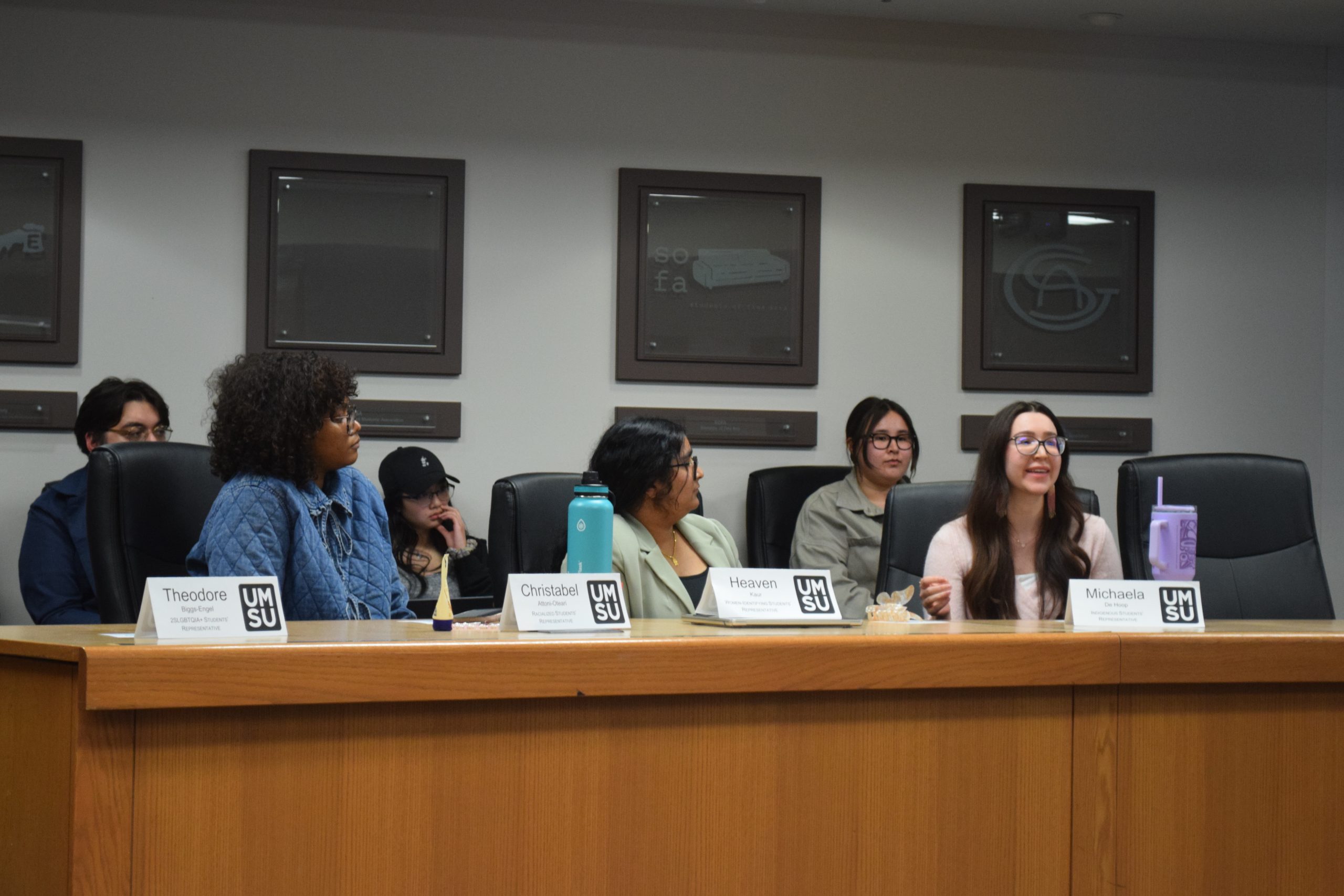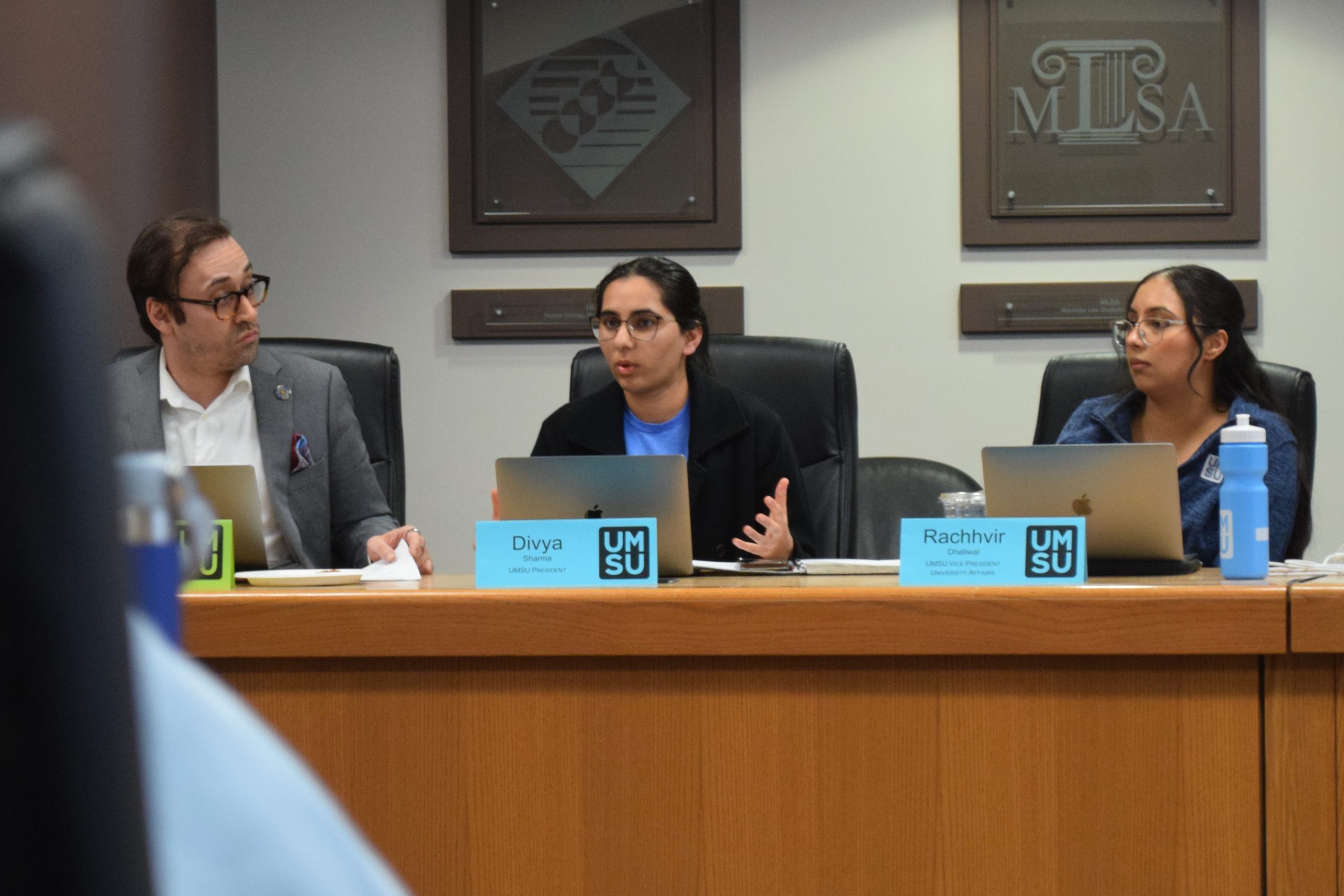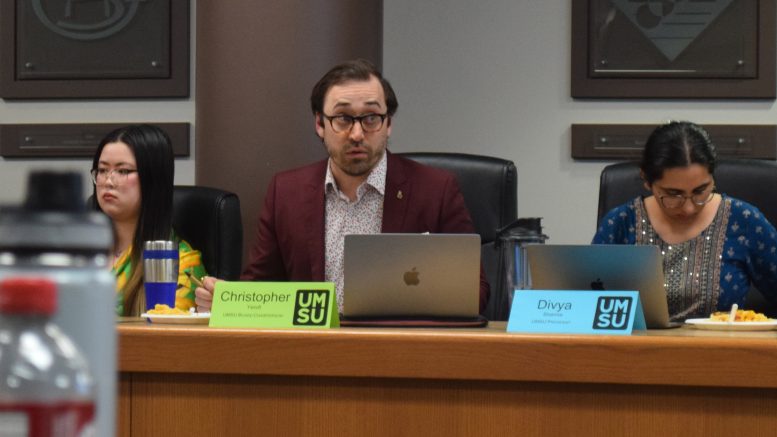A motion for the University of Manitoba Students’ Union (UMSU) community representatives to receive a $500 honorarium was ruled out of order at the April 24 UMSU board of directors meeting.
The motion was previously put forward at the April 10 UMSU board meeting by student-at-large Victoria Romero and referred to finance committee for review.
Interim board chairperson Christopher Yendt ruled that the motion violated a clause in UMSU’s bylaws which states that “appointees to a governing body shall not be entitled to any remuneration” with an exception “for seats of a governing body assigned to the appointee to a position of title or to an UMSU employee where explicitly allowed in these bylaws.”
The chair’s decision was appealed by Andrew Beck, Interdisciplinary Health Program Students’ Association representative “for the sake of conversation,” but was sustained by the board of directors.
It was revealed during conversation that another clause in UMSU’s bylaws states that “appointees to director positions shall receive no remuneration.”
“[This] only adds credence to the original argument,” stated Yendt.
Despite both clauses appearing in UMSU’s bylaws dating back to at least April 2018, 2SLGBTQIA+ students’ representative Theodore Biggs-Engel previously claimed that community representatives received honoraria for at least the past two years.
“What it appears to me now is that there has been unequal enforcement of the rules from last year into this,” stated incoming vice-president external affairs Jared Ramos Murphy to board members.
Ramos Murphy questioned the possibility to “correct [the bylaws] now,” with Yendt stating that since “the board is the one that approves the [bylaws] document, the board can break the [bylaws] document.”
Yendt added that “the implication of that is pretty seismic, because you have a very set-out process by which you revise and approve and change the bylaws.”
No changes were ultimately made to UMSU’s bylaws during the meeting.
Though the honoria motion was ruled out of order, vice-president finance and operations Carolyn Wang stated that “the conclusion that a lot of the finance committee members came up to is that they didn’t really have enough performance indicators to make the decision.”
Wang noted that “possible solutions” were discussed for community representative honoraria in the future, “such as written reports that finance committee can access, measurable [key performance indicators] and possible bylaw amendments.”
It’s about feeling appreciated, say community representatives

Racialized students’ representative Christabel Attoni-Oteari (left), Women’s Centre representative Heaven Kaur and Indigenous students’ representative Michaela de Hoop (right) were amongst the community representatives that spoke of the hardships they experienced during the year in their positions. Photo by Milan Lukes
During an open discussion on the out-of-order motion, multiple community representatives noted that the sentiment of feeling appreciated was valued more than the amount of the honorarium.
“It’s a little frustrating this year to put in the work that we put in, not get any support and then not get any appreciation at the end,” said Christabel Attoni-Oteari, racialized students’ representative.
“It’s not about the money amount, it’s about the appreciation,” she said. “I just wanted to feel appreciated.”
Attoni-Oteari described a year “filled with a lack of support from [the] executive team,” claiming that every issue brought forward was either tabled for later executives to deal with “or straight-up ignored.”
She referenced issues such as trying to get a community representative coordinator, a float for financing events and a larger Racial Equity and Inclusion Alliance office.
Attoni-Oteari added that she had zero conversations this year with some UMSU executives, claiming that some have “not even tried at all” to engage in discussions.
“If I was to get an honorarium, my plan was to use part of that money to pay the rest of my community members, because they put in a lot of work,” she said.
Michaela de Hoop, Indigenous students’ representative, stated that she always bought her executive team coffees “because I know what it’s like to not be valued.”
“I took on my role to connect with my community, but it truly isolated me more from it, because I became this big, bad villain of UMSU to them,” she said.
“They just saw me as this bureaucratic entity,” she added, noting that she had to lay down the rules.
“And they stopped seeing me as a member of the community supporting each other, and it was really, really hard.”
Gurpahul Kaur, Arts Student Body Council UMSU director, stated that she had nothing to say against the chair’s ruling on the motion “because it made sense, if the bylaws say it, the bylaws say it,” but added that honoraria “should have been done.”
“For any future community reps, I will do everything in my power to ensure that your work is recognized, whether that be through an honorarium,” stated Ramos Murphy.
Sharma announces $250 gift cards for community representatives

Directly after a special board meeting held the following day, UMSU president Divya Sharma (centre) announced that community representatives would receive a $250 UMSU gift card “along with a special note.” File photo from March 27 by Milan Lukes
The following day, UMSU president Divya Sharma announced on behalf of the executive committee that community representatives would each receive a $250 UMSU gift card “along with a special note” after “a lot of reflecting.”
“We recognize all the hard work that you’ve done,” said Sharma.
“We appreciate the countless hours that you have put in and more than that, we also appreciate your willingness to be open with us yesterday.”
Sharma made the remarks directly after a special UMSU board meeting that was held to reveal the findings of an investigation into the international students’ representative. The accusations laid out in a previous motion were deemed to be unsubstantiated by an ad-hoc committee.
“We had a very robust discussion in terms of the board remuneration process,” said Sharma, who noted that it is the finance committee’s decision — not the executive committee’s decision — to provide honoraria.
“We understand a lot of the burdens that come with holding office,” she said, adding that “it takes a lot of courage to be able to share some of your experiences.”



